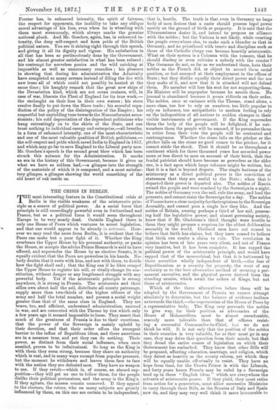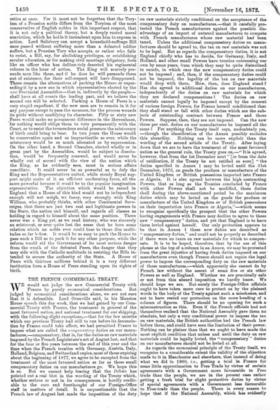THE CRISIS IN BERLIN.
THE most interesting feature in the Constitutional crisis at Berlin is the visible weakness of the aristocratic prin- ciple as a source of political power. As a social force that principle is still exceedingly powerful even in Switzerland and France, but as a political force it would seem throughout Europe to be very nearly dead. Outside England there is only one House of Peers which ventures to arrest legislation, and that one would appear to be already in extremis. How- ever we may read the news from Berlin, it is evident that the Peers can make but a poor fight of it. Whether the King overbears the Upper House by his personal authority, or packs the House, or accepts the advice Prince Bismarck is said to have offered, and supersedes the House by an elective Senate, it is equally evident that the Peers are powerless in his hands. No- body doubts that it rests with him, and not with them, to decide how the fight shall end ; that the King can if he likes compel the Upper House to register his will, or vitally change its con- stitution, without danger or any lengthened struggle with any powerful body. Yet if the aristocratic principle is strong anywhere, it is strong in Prussia. The aristocrats and their allies own about half the soil, distribute all county patronage, supply more than two-thirds of the higher officers of the army and half the total number, and possess a social weight greater than that of the same class in England. They are brave, too, and efficient, understand administration, succeed in war, and are connected with the Throne by ties which only a few years ago it seemed impossible to loose. They assert that much of the greatness of Prussia is due to their exertions, that the power of the Sovereign is mainly upheld by their devotion, and that their order offers the strongest barrier to the influx of Republican ideas, and these assertions are in a measure true, and yet they can do nothing. Their power, as distinct from their social influence, when once assailed, proves to be infinitesimal. So long as the King is with them they seem strong, because they share an authority which is real, and in many ways exempt from popular pressure, but the moment he withdraws and leaves them face to face with the nation they are defeated men. They have no weapon to use. If they revolt—which is, of course, an absurd sup- position—they will get no one to follow them, for the people dislike their political pretensions, and the army is the King's. If they agitate, the masses remain unmoved. If they appeal to the electors, the voters, who on many subjects are greatly influenced by them, on this one are certain to be independent, that is, hostile. The truth is that even in Germany no large body of men desires that a caste should possess legal power merely on the ground of birth or property. It is said that the Ultramontanes desire it, and intend to propose an alliance with the nobles ; but the Vatican is not likely, while courting the people everywhere else, to make such a blunder as that in Germany, and no priesthood with tenets and discipline such as those of the Catholic clergy can become heartily aristocratic. What on their system is a Colonna with the tonsure, that he should disobey or even criticise a nobody with the crozier ? The Germans do not, so far as we understand them, hate their nobles as the French did, or object to accord them social position, or feel annoyed at their employment in the offices. of State ; but they dislike equally their direct power and the use they make of it, and now that it is attacked will not defend them. No member will lose his seat for not supporting them. No Minister will be unpopular because be assails them. No journal is abandoned because it pours ridicule on their order. The nobles, once at variance with the Throne, stand alone, a mere class, too few to rely on numbers, too little popular to rely on influence, too antipathetic to modern feeling to rely on the indisposition of all nations to sudden changes in their visible instruments of government. If the King supersedes them the body of the people will be delighted, if he out- numbers them the people will be amused, if he persuades them to retire from their vote the people will be contented and contemptuous. Whether the stone falls on the pitcher or the pitcher falls on the atone no good comes to the pitcher, for it cannot abide the shock. That it should be so throughout a continent which for three thousand years has accorded power more or less direct to men on account of their birth, that the feudal patriciat should have become as powerless as the older one, is a fact upon which large volumes might be written, but that it is a fact is beyond dispute. The single buttress of the aristocracy as a direct political power is the conviction of statesmen that they are useful to the State ; when that is departed their power is departed also. The nobles of Russia owned the people and were crushed by the Sovereign in a night. The nobles of Germany own the soil, rule the army, and lead the peasants, and cannot resist the Sovereign for a day. The nobles of France have a clear majority for their opinions in the Sovereign Assembly, and cannot pass a single law they like. And the nobles of Britain, owning perhaps a third of her soil, possess- ing half the legislative power, and almost governing society, know that if Mr. Gladstone's third thought were hostile to them they might prepare a requiem for the oldest deliberative assembly in the world. Civilised men have not ceased to believe that birth has claims, but they have ceased to believe that birth can confer a claim to rule. The revolution in opinion has been of late years very silent, and out of France very inactive, but it has been complete. It has sapped the political power of the aristocratic principle, and would have sapped that of the monarchical, but that it is buttressed by three securities wholly independent of birth,—the fear of
Republicanism as a security for property, the want of any certainty as to the best alternative method of securing a per- manent executive, and the physical power derived from the standing armies, which await the orders of Kings, but not those of aristocracies.
Which of the three alternatives before them will be adopted by the Government of Prussia we cannot attempt absolutely to determine, but the balance of evidence inclines us towards the third,—the supersession of the House of Peers by a representative body. The King may persuade the nobles to give way, for their position as adversaries of the
House of Hohenzollern must be almost unendurable, scarcely more tolerable than that of officers resist- ing a successful Commander-in-Chief, but we do not
think he will. It is not only that the position of the nobles in their counties is very valuable, for as that must go in any case, they may drive that question from their minds, but that they dread the entire course of legislation on which their
Government has embarked. They know that other Bills will be proposed, affecting education, marriage, and religion, which
they detest as heartily as the county reform, yet which they
will be equally unable effectually to resist. They have no hope from time, for the Crown Prince is with the Liberals, and forty years hence Prussia may be ruled by a Sovereign
bred up in those "English ideas" which are everywhere the solvents of aristocratic power. If they yield, they must retire
from action for a generation, must allow successive Ministries to carry.through their Bills, as the Senates of Italy and Spain now do, and they may very well think it more honourable to retire at once. For it must not be forgotten that the Tory- ism of a Prussian noble differs from the Toryism of the most conservative of English nobles in this important respect, that it is not only a political theory, but a deeply rooted moral conviction, which he holds it incumbent upon him to express in action. Lord Salisbury can accept a household-suffrage Bill once passed without suffering more than a defeated soldier suffers, but a Prussian Tory who accepts, or rather who fails to resist, a Bill, say, for abolishing privileges, or establishing secular education, or for making civil marriage obligatory, feels like an officer who has deliberately deserted his regimental colours in the hour of action. The King will scarcely per- suade men like these, and if he does he will persuade them out of existence, for their self-respect will have disappeared. There remain the alternatives of packing the House or super- seding it by a new one in which representatives elected by the new Provincial Assemblies—that is, indirectly by the people— shall have at all events the leading part, and we believe the second one will be selected. Packing a House of Peers is a very stupid expedient. if the new men are to remain in it for any purpose except to pass the measure, for the process wounds its pride without modifying its character. Fifty or sixty new _Peers would make no permanent difference in the Herrenhaus, for nothing would oblige them to vote permanently with the Court, or to resist the tremendous social pressure the aristocracy of birth could bring to bear. In two years the House would be conservative again and as impracticable as ever, while the aristocracy would be as much alienated as by supersession. On the other hand, a Second Chamber, elected wholly or in great part by the Assemblies, would be subject to dissolu- tion, would be frequently renewed, and would never be wholly out of accord with the view of the nation which the King, as he evidently sees, must in serious affairs conciliate. It could never be so powerful as to defy the King and the Representatives united, while steady Royal sup- port might make of it an efficient moderating force, all the more powerful because it would be to the popular imagination representative. The objection which would be raised in England that a House of this kind would not be independent enough will not weigh, we fancy, very strongly with King William, who probably thinks, with other Continental Sove- reigns, that there are just two real and legitimate powers in the State, the nation and himself, and regards all classes as holding in regard to himself about the same position. There never was a King yet, as we read history, who was sincerely an aristocrat, or ever quite lost the sense that he bore some relation which no noble ever could bear to those dim multi- tudes so far blow. It would be as easy to pack the House to pass such a Bill as to pack it for any other purpose, while the reform would rid the Government of its most serious danger from the wrath of the defeated Peers, the danger that they may side with the Catholic multitude in resisting the Bills in- tended to secure the authority of the State. A House of Peers with thirteen millions behind it is a very different institution from a House of Peers standing upon its rights of birth.



































 Previous page
Previous page